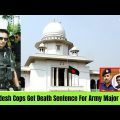(7 Jun 2016) A university professor on his way to work in northwestern Bangladesh was hacked to death on April 23rd 2016 in an attack similar to other killings by suspected Muslim militants, police said.
A.F.M. Rezaul Karim Siddique was attacked on the way to the state-run university in Rajshahi city, where he taught English, according to police.
The attackers used sharp weapons and fled the scene immediately after, a police commissioner said.
The attack was similar to recent killings of atheist bloggers in Muslim-majority Bangladesh by radical Islamic extremists.
No groups have claimed responsibility for the attack and police are investigating.
***
The Supreme Court of Bangladesh on May 5th upheld a death sentence given to Motiur Rahman Nizami, leader of Bangladesh’s largest Islamist party.
Nizami, the head of the Jamaat-e-Islami party, was sentenced to death for atrocities and multiple killings committed during the nation’s independence war against Pakistan in 1971.
A special tribunal dealing with war crimes convicted Nizami on 16 charges, including genocide, murder, torture, rape and destruction of property.
With the rejection of his review petition on May 5th, the last legal barrier to his execution has been removed unless he gets presidential clemency which is unlikely.
Bangladesh says Pakistani soldiers, aided by local collaborators, killed 3 million people and raped 200,000 women during the war.
The head of Bangladesh’s largest Islamist party was executed on May 4th for his role in acts of genocide and war crimes during the country’s independence war against Pakistan in 1971, officials said.
Additional Police Commissioner, Sheikh Md Maruf Hasan, told reporters gathered outside Dhaka central jail that Motiur Rahman Nizami, the 73-year-old leader of the Jamaat-e-Islami party, was hung at 12:10 am (1810 GMT Tuesday).
Hasan said Nizami’s body had been removed from the jail and was being transported to a family graveyard in the northwestern district of Pabna, his ancestral home.
The execution came a few hours after Nizami’s family had visited him for the last time.
Nizami was convicted of three major charges stemming from the 1971 war – including the killings of 480 people.
Nizami refused to seek presidential clemency to commute his death sentence, which a condemned man can seek from the country’s figurehead president.
But Nizami did seek a review of his death sentence through the judicial system, but the country’s Supreme Court upheld his punishment.
He was also held responsible for the killings of dozens of intellectuals, including teachers, journalists and doctors, just two days before Bangladesh gained its independence in 1971.
Nizami is the fifth senior official from opposition parties to be executed since 2013 for war crimes carried out during the 1971 war.
Three other senior members of Nizami’s Jamaat-e-Islami party and a top leader of the main opposition Bangladesh Nationalist Party led by former Prime Minister Khaleda Zia were also hanged.
Trying suspected war criminals has posed a major challenge for Prime Minister Sheikh Hasina, who has faced strong international pressure to stop executing people such as Nizami who acted against the country’s struggle for independence.
Amnesty International and Human Rights Watch had protested the death sentence.
The human rights groups also raised questions about the standard of the trial process, but Hasina and her colleagues have rejected claims that the judicial procedures were flawed.
***
Rahman said the three men on a motorbike first shot Ganguly and then slashed him with sharp weapons before they fled the scene.
Find out more about AP Archive: http://www.aparchive.com/HowWeWork
Twitter: https://twitter.com/AP_Archive
Facebook: https://www.facebook.com/APArchives
Instagram: https://www.instagram.com/APNews/
You can license this story through AP Archive: http://www.aparchive.com/metadata/youtube/40ab623564e54a20aeba08f635fd2a95








